Find your Hungarian supervisor and come to Hungary as a Marie-Skłodowska Curie Postdoctoral Fellow!
Marie-Skłodowska Curie Actions are the European Union’s flagship funding programme for doctoral education and postdoctoral training of researchers.
MSCA Postdoctoral Fellowships enhance the creative and innovative potential of researchers holding a PhD who wish to acquire new skills through advanced training, international, interdisciplinary and inter-sectoral mobility. MSCA Postdoctoral Fellowships is open to excellent researchers of any nationality, undertaking international mobility. Applications will be made jointly by the researcher and a host institution; the supervisor is the senior researcher appointed at the host institution to supervise the postdoctoral researcher throughout the whole duration of the action. All disciplines are eligible for Postdoctoral Fellowships.
The NCP Hungary Horizon Europe Team at the National Research Development and Innovation Office helps you match with your future supervisor: please find below the host offers of excellent Hungarian universities and research institutions looking for interested postdoctoral researchers in cutting-edge research areas to apply for the MSCA PF 2025 call.
Faculty: Faculty of Information Technology and Bionics
Name of the supervisor: Prof. Franciska ERDŐ
Organisational Unit / Research Group: Barrier Modeling and Innovative Pharmaceutics Research Group
Research team:
Group members:
- Franciska Erdő
- Fanni Szepetneki
- Lizett Maticsek
- Tshepang Mqatiwa
- Timea Beskid
- Lunter D, et al. " Progress in Topical and Transdermal Drug Delivery Research—Focus on Nanoformulations." Pharmaceutics, 2024, 16(6): 817. doi:10.3390/pharmaceutics16060817
- Kocsis D, et al, "Transdermal Delivery of α-Aminophosphonates as Semisolid Formulations—An In Vitro-Ex Vivo Study." Pharmaceutics 2023, 15(5): 1464. doi:10.3390/pharmaceutics15051464
- Kocsis D, et al. "Structural and Functional Analysis of Excised Skins and Human Reconstructed Epidermis with Confocal Raman Spectroscopy and in Microfluidic Diffusion Chambers." Pharmaceutics 2022, 14(8): 1689. doi:10.3390/pharmaceutics14081689
- Kocsis D, et al. "Drug Delivery through the Psoriatic Epidermal Barrier—A “Skin-On-A-Chip” Permeability Study and Ex Vivo Optical Imaging." International Journal of Molecular Sciences 2022, 23(8): 4237. doi:10.3390/ijms23084237
- Szederkényi G, et al. "Mathematical modeling of transdermal delivery of topical drug formulations in a dynamic microfluidic diffusion chamber in health and disease." PLOS ONE 2024, 19(4): e0299501. doi:10.1371/journal.pone.0299501
- Ponmozhi J, et al. "Models for barrier understanding in health and disease in lab-on-a-chips." Tissue Barriers. 2024 Apr 2;12(2):2221632. doi:10.1080/21688370.2023.2221632
- Kocsis D, et al. "Characterization and ex vivo evaluation of excised skin samples as substitutes for human dermal barrier in pharmaceutical and dermatological studies." Skin Research and Technology 2023, 29(4): e13165. doi:10.1111/srt.13165
- Kocsis D, et al. "In Vitro Functional and Structural Evaluation of Low-Complexity Artificial Human Epidermis for 3D Tissue Engineering." Bioengineering 2025, 12(3), 230 doi:10.3390/bioengineering12030230
- Asbóth D, et al. "Rodent models of dermatological disorders." Ital J Dermatol Venerol. 2024 Jun;159(3):303-317. doi:10.23736/S2784-8671.23.07700-9
- Participation in collaborative projects (2023, 2025) with University of Vienna, Austria (drug delivery and novel drug formulations), University of Tours, France (skin analysis by confocal Raman spectroscopy, cosmetic approaches), University of Tallinn, Estonia (electrospinning, drug loaded nanofiber formulations)
- CEEPUS (2024): hosting a professor from Serbia, for seminars and consultations on innovative nanoformulations and drug delivery
- Mecenatura grant for organization of international conference in Budapest (MEC-2024)
- Sending and accepting students for internships (ERASMUS+, 2024, 2025)
ORCID:Franciska Erdő (0000-0001-6265-3777) - ORCID
Contact e-mail: erdo.franciska@itk.ppke.hu
Download hosting offer: MSCA PF HOSTING OFFER – Barrier Modeling and Innovative Pharmaceutics Research GroupDOCX (56 KB)
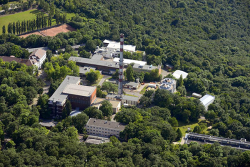 Name of the host institution: HUN-REN Wigner Research Centre for Physics
Name of the host institution: HUN-REN Wigner Research Centre for PhysicsDepartment: Department of Computational Sciences
Name of the supervisor: Gergő Orbán
Organisational Unit / Research Group: Computational Systems Neuroscience Lab
Research team:
- PI: Gergő Orbán (EXPERTISE: systems neuroscience: vision, decision making, visual cortex, pfc; machine learning: generative models, Bayesian computations, probabilsitc programs, dimensionality reduction; cognitive science: subjective internal models, vision, memory)
- 3 postdocs, 2 PhD students, 2 international interns, 5 MSc/BSc students (BACKGROUND: physics, medical sciences, machine learning, neuoscience, applied math, cognitive science)
- the theoretical lab is closely collaborating with a network of experimental labs from UCLA, CA US;, University of Cambridge, UK; Rutgers University, NJ, US; ETH Zürich, CH; INSERM, Lyon, France
- Earlier grants include HFSP Research Grants
- The lab has hosted Fulbright Scholars
- Extensive experience with MSCA fellowships: the head of the lab is an MSCA IEF alumnus, former lab members have successfully applied to MSCA, and can highly effectively support MSCA grant writing.
ORCID: https://orcid.org/0000-0002-2406-5912
Contact e-mail: orban.gergo@wigner.hu
Download hosting offer: MSCA PF HOSTING OFFER – WIGNER, Computational Systems Neuroscience Lab DOCX (18 KB)
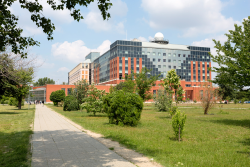 Name of the host institution: Budapest University of Technology and Economics
Name of the host institution: Budapest University of Technology and EconomicsFaculty: Faculty of Chemical Technology and Biotechnology
Name of the supervisor: Dr Andras Jozsef Toth, PhD
Organisational Unit / Research Group: Department of Chemical and Environmental Process Engineering / Environmental and Process Engineering Research Group
Research Team:
-
Ms Eniko Haaz
Distillation
Membrane separation -
Ms Huyen Trang Do Thi
Modelling of membrane operations
Wastewater treatment
Life Cycle Assessment
- 2025.03.01–2026.02.28: Varga József Foundation – Michael Somogyi Program: Improving the efficiency of distillation methods
- 2025.01.01–2025.06.30: MTA Youth International Conference Scientific Program – INKP2025-3: Environment-oriented assessment and energy development of hybrid separation methods in the chemical industry
- 2023.01.01–2023.05.31: MTA Youth International Conference Scientific Program – INKP2023-38: Development of hybrid organophilic pervaporation and distillation method for separation of mixture containing heterogeneous azeotropic
- 2022.01.01–2022.12.31: Scientific Patronage Program – 140699: Comparative evaluation of process wastewater treatment methods: separation methods and incineration
- 2021.07.01–2022.12.31: National Talent Program – NTP-NFTÖ-21-B-0014: Investigation of competitive membrane operations in the chemical industry: development of pervaporation method
- 2021.05.01–2021.08.31: Hungarian State Eotvos Scholarship – 156628: Evaluation of process wastewater treatment processes by life cycle assessment
- 2020.07.01–2021.06.30: National Talent Program – NTP-NFTÖ-20-B-0095: Development of modelling of separation processes in process simulator environment
- 2020.07.01–2022.06.30: Thematic Excellence Program – National Challenges Program - TKP-1-1/PALY-2020: Efficiency enhanced and intelligent manufacturing technology - Intensification of chemical technologies
- 2019.12.01–2024.08.31: OTKA – 131586: Improvements for circular economy: development of new physicochemical process wastewater treatment methods and their evaluation
- 2019.09.01–2020.06.30: ÚNKP – 19-4-BME-416: Comparison of process wastewater treatment methods: distillation and membrane processes
- 2019.05.01–2020.06.30: Thematic Excellence Program – TUDFO/51757/2019-ITM: Efficiency enhanced and intelligent manufacturing technology - Intensification of chemical technologies
- 2018.09.01–2019.06.30: ÚNKP – 18-4-BME-209: Study of liquid waste treatment processes to design the best practicing technologies
- 2017.09.01–2020.08.31: Bolyai – 432/17/6: Development of liquid waste treatment in the circular economy
- 15.10.2010–01.03.2014: Swiss-Hungarian Cooperation Programme – SH 7/2/14: Towards a sustainable fine chemical pharmaceutical industry: screening and re-utilisation of carbon rich liquid wastes
- 01.12.2013–30.11.2016: 544364-TEMPUS-1-12013-DE-Tempus-JPHES: International Joint Master Program on Material and Energy Flow Management
- 09.2014–09.2016: Visegrad Fund – Ecomarket Prospects of the Visegrad Cooperation in Promoting a Sustainable Consumption and Production Model
- Treatment of process wastewaters with distillation and membrane methods
- Modelling of membrane operations
- Research of hybrid separation systems based on membrane methods
- Life cycle assessment of chemical processes
- Circular economy
- Research of alcohol absolutization and dehydration methods
- Environmental benign process design
- Carbon capture and storage (CCS)
Contact e-mail: andrasjozseftoth@edu.bme.hu
Download hosting offer: MSCA PF HOSTING OFFER – BME, Environmental and Process Engineering RG DOCX (19 KB)
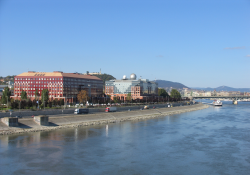 Name of the host institution: Eötvös Loránd University, Budapest, Hungary
Name of the host institution: Eötvös Loránd University, Budapest, HungaryFaculty: Faculty of Science
Name of the supervisor: Mihály Kovács
Organisational Unit / Research Group: Department of Biochemistry / Motor Enzymology Research Group
Research Team: Mihály Kovács, group leader
Research area: stress response, protein condensation, DNA repair
Project experiences (EU / international):
International funding:
- NIH Global Health Research Initiative 1 R01 TW007241-01, 2005-2010
- EMBO-HHMI Startup Project No. 1233, 2006-2008
- Human Frontier Science Program Research Grant RGY0072-2010, 2010-2014
- Swiss National Science Foundation, Multilateral Academic Projects, 2025-2029
- Marie Curie International Outgoing Fellowship INOHR, supervisor, 2012-2015
- Marie Curie Reintegration Fellowship HJMIGRA, supervisor, 2015-2017
- Biochemical, genetic and pharmacological engineering of nucleoprotein condensation-based stress response (NKKP ADVANCED-150087): Stress response is of cardinal importance in biology and medicine. Evidence is accumulating for the central roles of stress granules (SGs), reversible structures that form in cells upon stress exposure. SGs can promote either cell survival or death, and are involved in cancer formation, drug resistance, cardiovascular diseases, aging, and neurodegeneration. By their chemical nature, SGs are protein-RNA condensates. The development of condensate-targeting drugs is a promising new area of pharmacology. In this project we capitalize on our recent discoveries and established capacities related to single-stranded DNA binding (SSB) proteins and helicases, proteins that proved to be key determinants of SG regulation.
- Extranuclear activities of genome maintenance protein complexes in stress response (Swiss National Science Foundation, Multilateral Academic Projects): The proposed work aims to define mechanisms how the mitochondrial single-stranded DNA binding protein (mtSSB) together with other factors maintain mitochondrial DNA (mtDNA) integrity, especially under conditions of stress. This research will fill critical gaps in our understanding of mtDNA metabolism, which is crucial for cellular energy production and overall mitochondrial function.
Contact e-mail: mihaly.kovacs@ttk.elte.hu
Download hosting offer: MSCA PF HOSTING OFFER – ELTE, Motor Enzymology RG DOCX (17 KB)
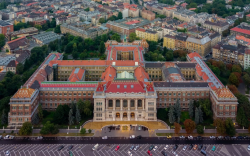 Name of the host institution: Budapest University of Technology and Economics
Name of the host institution: Budapest University of Technology and EconomicsFaculty: Faculty of Chemical Technology and Biotechnology
Name of the supervisor: Péter Nagy
Organisational Unit / Research Group: ERC Molecular Quantum Simulation Research Group
Research Team: Team members: PI, 4 postdoc, 3 PhD, 3 undergraduate
Expertise: development of quantum chemistry models and programs with universally trusted predictive power and their acceleration to routinely affordable simulation times. Modeling and understanding of complicated molecular interactions and reactions that are not accessible accurately without our models, across homogeneous, surface and enzyme catalysis.
Project experiences (EU / international):
European Research Council (ERC) project 2023 aCCuracy: Turning gold standard quantum chemistry into a routine simulation tool: predictive properties for large molecular systems
MSCA PF project 2025 DNACopyComp: Development of a predictive quantum simulation protocol for understanding DNA polymerase function and toxic inhibition
Research Interests: Development of quantum chemistry models and programs:
- improving the accuracy and speed of our methods via better approximations (via, e.g., higher-order perturbative estimates, explicit electron correlation, improved long-range interactions, etc.) and a massively parallel code
- development and practical implementation of similarly efficient DFT and local CCSD(T) level observables, such as thermodynamic, structural, spectroscopic, and dynamic molecular properties
- Further development and application of our multilevel or embedding methods using gold standard accuracy for the chemically active region combined with cost-efficient models (MP2, DFT, ML, MM) to take into account biochemical, crystal, and solvent environment effects.
- Blending wavefunction and DFT methods to extend and improve our double-hybrid and wavefunction-in-DFT embedding approaches
- Extensions of these efficient and accurate DFT, PT, and CC methods to open-shell and multireference systems. Predictive modeling and atomistic understanding of challenging covalent- and non-covalent interactions in large molecules using our models, where modern workhorse computational methods (such as DFT) have well-known difficulties:
- complicated interactions between large molecules governing, e.g., supramolecular and catalyst-substrate interactions. E.g., protein-drug interactions.
- the mechanism of environment-friendly and selective organo-, and earth-abundant transition-metal catalytic reactions. E.g., CO2 and N2 reduction.
- surface and enzyme catalysis in proper solvent, crystal, and protein environment. E.g., computational mechanistic study of phosphate reactions relevant to cancer formation or human DNA and viral RNA polymerization and related drug desin.
Detailed project description: www.fkt.bme.hu/~theoreticalchem/index.php/open-positions
ORCID: orcid.org/0000-0001-6692-0879
Contact e-mail: nagy.peter@vbk.bme.hu
Download hosting offer: MSCA PF HOSTING OFFER – BME, Molecular Quantum Simulation RG DOCX (16 KB)
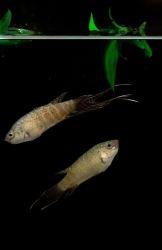 Name of the host institution: ELTE Eötvös Loránd University
Name of the host institution: ELTE Eötvös Loránd UniversityFaculty: Faculty of Science
Name of the supervisor: Dr. Máté Varga
Organisational Unit / Research Group: ELTE Fishgenetics Group
Research Team:
-
Dr. Máté Varga (PI)
Developmental geneticist, interested in modeling of monogenic human diseases, and also in understanding the genetic underpinnings of evolutionary novelties and behavior. -
Dávid Czimer (PhD student)
Creating and analyzing zebrafish models of human calcification disorders and other rare diseases. Imaging expert also interested in behavioral analysis -
Renáta Hamar (PhD student)
Working with models of human pseudouridylation disorders, and bioinformatic analysis of snoRNAs. -
Latifa Kazzazy (PhD student)
Exploring the role of uracil in DNA during early stages of development and phenotyping mutants impaired in the base excision repair (BER) pathway. -
Nóra Szabó (PhD student)
Spearheading the efforts of our group to (re)establish paradise fish as a model for evodevo and behavioral studies. Interested in the origins of evolutionarily novel organs.
More recently we became interested in developing paradise fish into a model of evo-devo and behavioral genetics. Using this new system we want to understand how adaptation to air-breathing develops in an animal that initially develops with its gills (funded by HFSP).
Project experiences (EU / international):
- A molecular roadmap for the emergence of air breathing (2025-2028) Human Frontiers Science Program (HFSP)
- SnoRNAs in IBD (2022-2025) Central Europe Leuven Strategic Alliance (CELSA)
- RECQL5 in zebrafish (2022-2023) Solve-RD
- To reveal the “molecular roadmap” the leads to the post-metamorphic appearance of air breathing in paradise fish. This innovative and collaborative project was recently funded by the HFSP, and will involve cutting-edge multiomics, genomic and imaging analysis to reveal the molecular and cellular processes involved in the formation of the labyrinth organ. Participants will also spend time at our Czech and Japanese partner labs to get first-hand experience in single-cell methodologies and light-sheet imaging
- To characterize novel zebrafish models of human ribosomopathies. One major consequence of faulty pseudouridylation in eukaryotic cells is defective ribosome biogenesis. Using our existing mutant strains we want to understand how cells defective in dyskerin-driven pseudouridylation deal with cellular stress. We also aim to reveal if tissue specific expression of snoRNAs (effectively guides for the post-transcriptional modification of rRNAs) can lead to the tissue-specific appearance of specialized ribosomes.
Contact e-mail: mvarga@ttk.elte.hu
Download hosting offer: MSCA PF HOSTING OFFER – ELTE, Fishgenetics RG DOCX (19 KB)
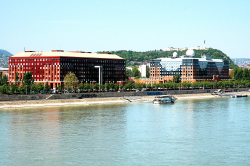 Name of the host institution: ELTE Eötvös Loránd University
Name of the host institution: ELTE Eötvös Loránd UniversityFaculty: Faculty of Science
Name of the supervisor: Máté Csanád
Organisational Unit / Research Group: Femtoscopy Research Group
Research Team
- Máté Csanád (professor; femtoscopy, QCD phase diagram, hydrodynamics, flow)
- Márton Nagy (femtoscopy, hydrodynamics, complex analysis)
- Dániel Kincses (postdoctoral researcher; femtoscopy, QCD phase diagram)
- Barnabás Pórfy (PhD student, femtoscopy, QCD phase diagram, data aquisition)
- + several other students working on various fields
https://phenix.elte.hu/
https://star.elte.hu/
https://normadiagnostika.com/norma-instruments-and-elte-university-collaborate-on-granulocyte-isolation-research
Research Interests: Femtoscopy encompasses methods that enable one to measure femtometer-scale geometries. In heavy-ion physics, this is achieved through the investigation of quantum-statistical correlations among the observed particles. The system's size, lifetime, geometrical as well as flow asymmetry can be studied, which, coupled with phenomenological models, carry information about the Equation of State of the matter. Furthermore, the strength of the multi-particle correlations reveals the ratio of primordial particles to decay products, has connections to in-medium mass modifications, symmetry restorations, and may give insight on possible exotic particle emitting sources such as coherent hadron production or pion lasers. Our group spearheads the effort to establish the methodology of novel types of femtoscopic measurements utilizing Lévy distributions to describe the system. We publish phenomenology and experimental papers on the topic at SPS (NA61), RHIC (PHENIX and STAR) and LHC (CMS). We welcome postdoctoral candidates interested in joining this endeavor, from the experimental (NA61, PHENIX, STAR or CMS) and/or the phenomenological side.
ORCID: https://orcid.org/0000-0002-3154-6925
Contact e-mail: csanad@elte.hu
Download hosting offer: MSCA PF HOSTING OFFER – ELTE, Femtoscopy RG DOCX (18 KB)
 Name of the host institution: Budapest University of Technology and Economics
Name of the host institution: Budapest University of Technology and EconomicsFaculty: Faculty of Natural Sciences
Name of the supervisor: Roland Molontay
Organisational Unit / Research Group: Human and Social Data Science Lab
Research Team: The Human & Social Data Science Lab (HSDSLab) is a group of researchers at the Budapest University of Technology and Economics led by Dr Roland Molontay. HSDSLab conducts both methodology oriented basic research in data and network science and applied research with a human-centered and societal focus. The lab members develop statistical and computational methods to study the empirical, theoretical, and technical dimensions of all forms of data in social, policy, and business contexts. The Lab’s research includes predictive analytics in human health and education, user behavior analysis, data-driven assessment and evaluation in higher education, social network analysis, structural characterization of complex networks, explainable artificial intelligence in human-centered and social sciences, scientometrics.
For our researc projects and publications see: https://hsdslab.math.bme.hu/en/research.html
Research Interests: Our research group focuses on data-driven, human-centered approaches to understanding complex social, scientific, and health-related systems. We are currently engaged in projects in human-centered predictive analytics, educational data science, science of science, social media analytics, network embedding, and health data science. These projects involve the application of advanced machine learning, deep learning, and network science techniques to large-scale, real-world datasets. We welcome applications from researchers interested in these areas, particularly those with strong programming skills in Python, excellent verbal and written communication skills in English, and a keen interest in interdisciplinary research. Ideal candidates are curious about AI, machine learning, and network science, and are able to work independently as well as in collaborative settings. We offer a vibrant, supportive research environment with opportunities for impactful work at the intersection of data science and the social sciences or biomedical sciences.
ORCID: https://orcid.org/0000-0002-0666-5279
Contact e-mail: molontay@math.bme.hu
Download hosting offer: MSCA PF HOSTING OFFER – BME, HUMAN AND SOCIAL DATA SCIENCE LAB DOCX (18 KB)
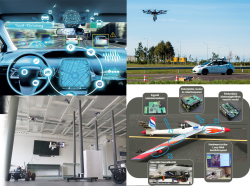 Name of the host institution: HUN-REN Institute for Computer Science and Control
Name of the host institution: HUN-REN Institute for Computer Science and ControlName of the supervisor: Péter Gáspár, PhD, DSc, Member of the Hungarian Academy of Sciences
Research Area:
- Control design methods based on linear and nonlinear models
- Components of vehicle control, e.g., variable-geometry suspension systems, global chassis control
- Cooperative control of a vehicle platoon system
- Integrated control systems for vehicles
- Supervisory decentralized architecture
Research Team
1. System and control theory – Dynamic systems in control theory
Zoltán Szabó, doctor of HAS
Research Area:
- LPV and hybrid modeling, system identification in nonstandard bases
- multivariable systems and robust control, geometrical control theory
- data driven methods and their applications
- fault detection, robust and reconfigurable fault tolerant control
Balázs Németh, doctor of HAS
Research Area:
- nonlinear analysis and synthesis of autonomous vehicle control systems
- coordination of learning-based and model-based control systems
- ethical aspects of autonomous vehicle control design
- variable geometry vehicle suspension analysis and control
Roland Tóth, Ph.D.
Research Area:
- modelling, system identification and control with the LPV framework
- machine learning based system identification
- learning based control with performance and safety guarantees
- motion control of mechatronic and robotic systems
- navigation and motion control of autonomous vehicles
Bálint Vanek, Ph.D.
Research Area:
- Flight control
- Aeroelasticity
- Fault detection
- Unmanned aerial vehicles
- Inertial and satellite navigation systems
- Autonomous Systems National Laboratory 2020-2026, RRF
- FaRADAI, 2021-2025
- COPROLOGS 2022-2025
- VISION, H2020-MG-2015_SingleStage-A:MG-1.8-2015
- Flipased, H2020-MG-2018-TwoStages
- EPIC 2016-2022, TEAMING project H2020
- US Air Force grants 2023-2026
- EDA projekt FaRADAI, 2021
- Research on Hydrogen-Powered, Cooperative Driverless Remote Sensing Devices and Related Data Processing Framework 2021-2025
- We have connection to the 2024-30 “PATTERN,” MSCA Doctoral Networks, (co-PI, EU Horizon 2020 program)
- Deterministic and stochastic theory of linear and nonlinear systems in continuous and discrete tim by means of algebraic and geometric approaches
- Controllability, observability, stability and structural resilience of dynamical systems
- Robust control and filtering in uncertain dynamical systems
- Modeling, analysis and synthesis of Linear Parameter Varying (LPV) systems
- Robust design of control systems based on µ-synthesis, linear matrix inequality (LMI) and integral quadratic constraints (IQC) techniques
- Model-based detection of system malfunctions and other malicious actions in cyber-physical systems, engineering diagnostics
- Synthesis of dependable systems
- Fault tolerant control in linear hybrid systems
- Optimal control and filtering in large-scale, heterogeneous distributed systems
- Control over networks, coordinated and cooperative control methods
- Model reduction in big dimension state-space systems
- Advanced signal and image processing, systems identification
Contact e-mail: autonom@nemzetilabor.hu
Download hosting offer: MSCA PF HOSTING OFFER – SZTAKI, System and Control Lab DOCX (23 KB)
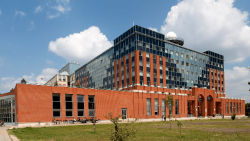 Name of the host institution: ELTE Eötvös Loránd University
Name of the host institution: ELTE Eötvös Loránd UniversityFaculty: Faculty of Science
Name of the supervisor: Eszter Ari, PhD
Organisational Unit / Research Group: Institute of Biology, Department of Genetics, Evolutionary Bioinformatics Research Group
Research Team
- Eszter Ari, associate professor, group leader
- Ágoston Hunya, graduate student
- András Asbóth, graduate student
- Csenge Gazsó, master student
- Dániel Hegedűs, master student
- Márk Hunor Juhász, bachelor student
- Norbert Kada, bachelor student
- evolution
- bioinformatics
- phylogenetics
- microbiology
- transcriptional regulation
- CHIP-seq, ATAC-Seq
International project experiences:
- Eszter Ari was a supervisor of a Visegrad 4 Eastern Partnership (V4Eap) 2014 – 2015 grant project, connected to the fellowship of Zeljko Popovic; Title: DORMANCYbase – developing a database on gene and protein expression during dormancy in animals; 3,000 EUR
- Supported Research Groups Programme 2025 - 2028: Roles: Eszter Ari - co-applicant, Ágoston Hunya - researcher; Title: Genomic surveillance for precision therapies against antibiotic-resistant bacteria; PI: Papp Balázs; Number: TKCS-2024/66; amount awarded to ELTE: 30,000,000 HUF
- ELTE international online courses 2025: the “Analysis of OMICS Data PR” was selected as a course in CHARM-EU; 500 000 HUF
- Hungarian National Research Fund Grant – Postdoctoral Excellence Programme 2020 - 2023: Eszter Ari’s role: Principal investigator; Title: How do ‘superbugs’ emerge? - A systematic study of the mobility of resistance and virulence genes in human microbiota and pathogenic bacteria; Nr. 131839; 25,500,000 HUF
Research topics:
- Investigating the mobility of antimicrobial resistance and virulence genes: Horizontal gene transfer between bacterial lineages is widespread and plays a key role in the evolution of antimicrobial resistance and virulence. Despite its clinical importance, however, we have only a limited understanding of (i) the general trends and impacts of gene exchange between virulent pathogens and multidrug-resistant commensal bacteria. We address these issues by analyzing the gene exchange networks of human microbiota, multidrug-resistant and pathogenic bacteria alike. We have published our previous works in Cell and Nature Microbiology.
- Creating and maintaining the TFLink database, an integrated gateway to access transcription factor - target gene interactions for multiple species: We created and maintain the TFLink database that uniquely provides comprehensive and highly accurate information on transcription factor - target gene interactions, nucleotide sequences and genomic locations of transcription factor binding sites for human and six model organisms. We integrated the results of small- and large-scale approaches from ten different databases. We are working on to make the database organ, tissue, and cell specific using data obtained by various high-throughput methods. We published our results in the Database journal.
- Developing python and R packages in the field of OMICS studies, epidemiology and phylogenetics: mulea, treepruner
Contact e-mail: arieszter@ttk.elte.hu
Download hosting offer: MSCA PF HOSTING OFFER – ELTE, Evolutionary Bioinformatics RG DOCX (19 KB)
 Name of the host institution: ELTE Eötvös Loránd University
Name of the host institution: ELTE Eötvös Loránd UniversityFaculty: Faculty of Science
Name of the supervisor: Katalin Solymosi
Organisational Unit / Research Group: Institute of Biology, Department of Plant Anatomy, ELTE Plastid Biology Lab
Research Team: Our research team has expertise in plastid biology and plant stress biology and in using methods like plant physiology, biophysics, biochemistry, proteomics, cell biology (ultrastructure), functional plant anatomy and developmental biology. Our main focus is on understanding chloroplast differentiation and the role of plastids in plant development, plant interaction with the environment (’plant immunity’) and abiotic stress responses (focusing on light, salt and drought stress) in the wider contexts of sustainable agriculture and climate change. Our research team is composed of the following researchers: Around 4-5 BSc, MSc and PhD students are also involved in our group’s activities.
For more information contact us or see here: katalinsolymosi.elte.hu
Ongoing/closed projects involve OTKA FK on salt and drought stress on the structure of plastids, Hungarian-Bulgarian bilateral grants on understanding the desiccation tolerance of Haberlea rhodopensis, and COST SUSTAIN (CA22144) project on saline agriculture.
Project experiences (EU / international): We have several ongoing international collaborations (see here). We are involved in COST SUSTAIN (CA22144) project on saline agriculture and applied for MSCA DN projects with part of the same network.
Research Interests: We expect the successful candidate(s) to conduct their research topics within the field of plastid biology. The project can cover any field of plastid biology, including the role of plastids in plant immunity (e.g. regulation of plastid structure and function within epidermal cells) and in abiotic (e.g. drought and salt stress) and biotic stress responses of plants. Other topics related to basic understanding of plastid development in plants and algae are also welcome. The main purpose of the fellowship is to qualify researchers for work in higher academic positions within their disciplines, to develop inter- and transdisciplinary skillsets, as well as expertise in science policy and science outreach.
ORCID: 0000-0001-5246-2547
Contact e-mail: katalin.solymosi@ttk.elte.hu
Download hosting offer: MSCA PF HOSTING OFFER – ELTE, Plastid Biology Lab DOCX (19 KB)
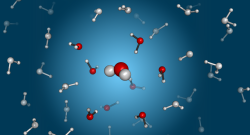 Name of the host institution: Eötvös Loránd University
Name of the host institution: Eötvös Loránd UniversityFaculty: Faculty of Science
Name of the supervisor: János Daru
Research Group: Institute of Chemistry | DaruLAB
Research Team:
Members:
- PI (János Daru)
- 3 PhD students
- 3 undergraduate students
- Machine Learning Potentials
- Ab Initio Molecular Dynamics
- Path Integral Molecular Dynamics
- Local Coupled Cluster calculations
- Reaction mechanisms
Research Interests:
Next-generation machine learning potentials (MLPs) to model aqueous-phase chemistry with quantum chemical accuracy. The project aims to integrate physically grounded representations with data-driven models trained on highly accurate local coupled-cluster (CC) reference calculations, ensuring transferability and chemical reliability.
Utilization of path-integral molecular dynamics (PIMD) to capture nuclear quantum effects (NQEs) and anharmonicity in hydrogen-bonded networks, and to describe isotope effects and tunneling.
Exploration of algorithmic strategies to couple MLP training pipelines with systematic CC benchmarks, including data selection, active learning, and handling long-range electrostatics. Acceleration of simulations via multiple time step and ring-polymer contraction-based methods.
Target applications include:
- Detailed mechanistic understanding of chemical reactions in solution.
- Accurate prediction of structural, thermodynamic, and dynamic properties of aqueous systems.
- Extension of MLPs to describe complex species in solution with chemical accuracy.
ORCID: 0000-0002-5630-6311
Contact e-mail: janos.daru@ttk.elte.hu
Download hosting offer: MSCA PF HOSTING OFFER – ELTE DaruLAB DOCX (20 KB)
 Name of the host institution: Eötvös Loránd University (ELTE)
Name of the host institution: Eötvös Loránd University (ELTE)Faculty: Faculty of Informatics
Name of the supervisor: Dr. Gábor Tamás Orosz
Organisational Unit / Research Group: Department of Data Science and Engineering - Best Practices Enhanced by Development Opportunities (BP-EDO)
Research Team:
- 11 MSc students of the Data Science master’s degree specialization
- Arafat Md Easin, PhD Candidate
- Asuah Georgina, PhD Candidate
- Munkácsi Imre, PhD Candidate
- Bouressace Kawkab, PhD Student
- Ayda Bransia, PhD Student
- Attila Selmeci, PhD Candidate
- Adam Tarcsi, Senior Researcher
- Márta Alexy, PhD, Associate Professor
- Tamas Orosz, PhD, Habil, Associate Professor
- Agricultural SAP implementation, 2023
- SAP Manufacturing Execution & Industry 4.0, 2022
- DATA-EDIH (European Digital Innovation Hub)
- Generative Models and LLM Integration
- Advanced Analytics & Predictive Modeling
- Natural Language Understanding
- Sustainability & Innovation in ERP
- In‑Memory Database Architectures
- Enterprise Architecture Best Practices
- Commercial & Open‑Source Technology Stacks
- Big Data, Machine Learning, and IoT in Enterprise Contexts
- Smart Automation & Intelligent Orchestration
- Cloud‑Native and DevOps‑Driven ERP Deployment
- Cognitive Information Systems & HCI
- AI‑ and BI‑Powered Enterprise Functions
- End‑to‑End Digital Transformation
ORCID: https://orcid.org/0000-0003-0595-6522
Contact e-mail: orosztamas@inf.elte.hu
Download hosting offer: MSCA PF HOSTING OFFER – ELTE, DATA SCIENCE AND ENGINEERING DEPARTMENT DOCX (27 KB)
If you are interested in any of the host offers, please send the completed application template, which can be downloaded here, to the contact email address provided in the respective host offer.
Who can apply for a Postdoctoral Fellowships?
Researchers interested in MSCA PF
- should have a PhD degree at the time of the deadline for applications. Applicants who have successfully defended their doctoral thesis but who have not yet formally been awarded the doctoral degree will also be considered eligible to apply
- must have a maximum of eight years experience in research, from the date of the award of their PhD degree, years of experience outside research and career breaks will not count towards the above maximum, nor will years of experience in research in third countries, for nationals or long-term residents of EU Member States or Horizon Europe Associated Countries who wish to reintegrate to Europe
- should comply with mobility rules: they must not have resided or carried out their main activity (work, studies, etc.) in the country of the beneficiary (for European Postdoctoral Fellowships), or the host organisation for the outgoing phase (for Global Postdoctoral Fellowships) for more than 12 months in the 36 months immediately before the call deadline






